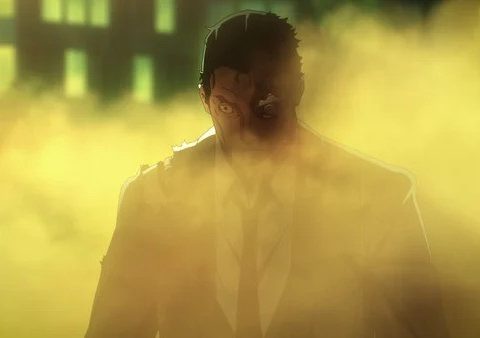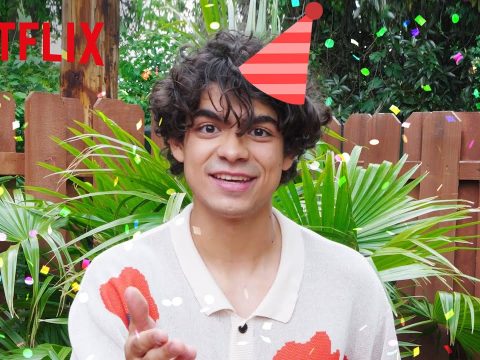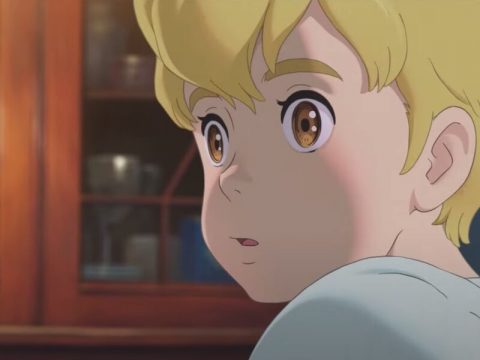Taking the planet back from the King

Oh, no! There goes Tokyo. And Shanghai. And New York City. And Paris, France. And Paris, Texas. And pretty much the entirety of the Earth’s habitable landmass. In fact, no quotation from a 1977 Blue Oyster Cult song can adequately sum up the degree of ecological devastation in Godzilla: Planet of the Monsters, the first part of a 3DCG animated film in three parts with direction by Kobun Shizuno and Hiroyuki Seshita and animation by Polygon Pictures and Toho Animation.
Set in a near future where humanity is plagued by a sudden onslaught of giant monsters, the human race looks to the stars for salvation. First, humans invoke the aid of the Exif and the Bilusaludo, a pair of vagabond humanoid alien races whose home planets were also destroyed by monsters. When that tactic fails miserably, a small pocket of humans, Exif, and Bilusaludo scramble onto a colony ship and beat a hasty retreat into deep space, abandoning Planet Earth to its new, undisputed ruler: Godzilla, the King of the Monsters.

Let’s face it: outer space sucks. After nearly two decades of near light-speed travel, the survivors aboard the colony ship Aratrum are fed up with the meager rations, the cramped quarters, and the process of sending their weak and elderly off to die in bogus exploration missions. And so Captain Haruo Sakaki (voiced by Mamoru Miyano in Japanese and Chris Niosi in English) and his friends lead an effort to turn the ship around and head back to Earth. A hyper-space fold allows them to make the return trip in a matter of minutes, but thanks to time-dilation, Haruo and company discover that nearly 20,000 years have passed on Earth, and the local flora and fauna have all adapted to a new bioweb with Godzilla at the absolute pinnacle. Do the united humanoid races have the moxie and mettle required to recapture the planet? We won’t know for certain until the two remaining installments have been published.
I admit that I see this film through Biollante-tinted glasses. When viewed as a stand-alone film, Godzilla: Planet of the Monsters is a bit of a train wreck, or more appropriately, a landing ship crash. The nearly 90-minute run time only encapsulates the first act of the story, and so many scenes are padded out with a nonstop barrage of technobabble and exposition. This leaves little room for character development. Don’t expect to explore the inner lives of Haruo or the rest of the crew; we don’t dig much deeper than “I hate Godzilla” and “I want to recapture the Earth” and “I’m a shady alien theocrat” in terms of motivations and dramatic needs. Also be aware that the film saves the bulk of its giant monster action sequences for the final 20 minutes, and screenwriter Gen Urobuchi delivers not only his typical skepticism of authority but also two big story swerves—one in the final 15 minutes of the film, and one as a post-credits stinger.

Currently streaming on Netflix as part of its original anime programming, Godzilla: Planet of the Monsters is not an easy film to recommend to either casual fans or to battle-hardened kaiju otaku. But despite its (many, glaring) flaws, I enjoyed Godzilla: Planet of the Monsters. Even though the titular monster looks like a mutated loaf of raisin bread run amok, I appreciate that Polygon Pictures and Toho Animation were able to convey a massive sense of size and scale with their giant monsters. Similarly, the music by Takayuki Hattori and the sound direction by Satoshi Motoyama were evocative of the big, bombastic, and unrelentingly silly aural landscapes of the best Godzilla films of the Showa Era. The plot may be thin, the characters may be plastic action figures for the directors to smack around on camera, and the monsters may be butt-ugly, but Godzilla: Planet of the Monsters still managed to keep me entertained, and I look forward to the remaining installments.
Studio/company: Netflix
available: Now
rating: TV-14
This story appears in the Spring 2018 issue of Anime USA Magazine. Click here to get a print copy.







